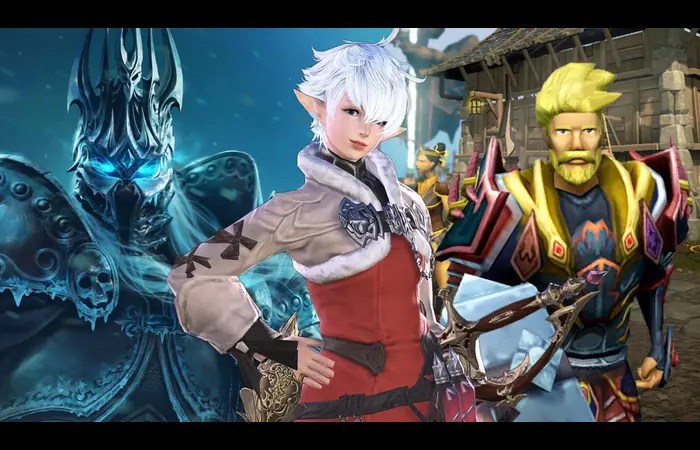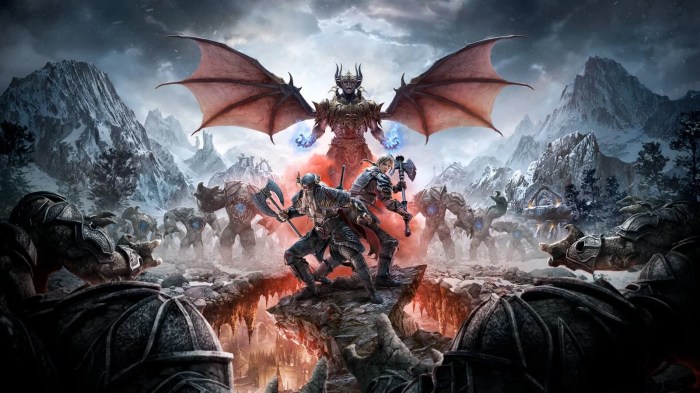
MMORPGs trending now are capturing the attention of gamers worldwide, blending immersive worlds with vibrant communities. These games are evolving rapidly, showcasing innovative gameplay mechanics that redefine player experiences.
With the emergence of new titles and the continual evolution of beloved classics, MMORPGs are not just games; they are social hubs where players interact, strategize, and form lasting friendships. Understanding these trends opens up a fascinating window into the future of online gaming.
Current Trends in MMORPGs
The landscape of MMORPGs is constantly evolving, driven by advancements in technology and shifting player expectations. Recent trends have introduced a variety of new gameplay mechanics and features that significantly enhance player engagement and overall experience. This dynamic environment reflects both the innovations of game developers and the desires of an ever-growing gaming community.With the rise of virtual reality and cross-platform play, many MMORPGs now feature immersive environments and seamless integrations that encourage social interactions and cooperative gameplay.
Additionally, the influence of mobile gaming has led to the emergence of MMORPGs that cater to on-the-go players, blending traditional MMORPG elements with flexible, mobile-friendly designs. This adaptation is reshaping how players connect and engage with one another.
Latest Features and Gameplay Mechanics
Recent MMORPGs have showcased several cutting-edge features that redefine player experience. Some notable mechanics include:
- Dynamic Events: Many games now incorporate world events that change based on player actions, creating a more immersive and reactive environment. This encourages collaboration among players to achieve common goals.
- Player-driven Economies: Games like “New World” emphasize player interactions with in-game economies, allowing players to trade resources and create their own market dynamics.
- Enhanced Customization: More recent titles offer extensive character customization options, enabling players to create unique avatars that reflect their personality and playstyle.
- Flexible Class Systems: Many games have begun implementing hybrid class systems that allow players to mix skills from different classes, providing a diverse gameplay experience tailored to individual preferences.
Influential MMORPGs that Have Emerged Recently
Several new MMORPGs have made a significant impact on the gaming community, each bringing unique elements and innovations to the genre. Recent influential titles include:
- Lost Ark: Launched in 2022, it features an isometric view and emphasizes fast-paced combat with a blend of action RPG elements, attracting players from various gaming backgrounds.
- Blue Protocol: This upcoming MMORPG combines anime-style graphics with action-oriented gameplay, generating excitement due to its aesthetic appeal and engaging mechanics.
- Throne and Liberty: Scheduled for release soon, it promises to offer a vast open world with impressive graphics and a focus on environmental interactions, showcasing the potential of next-generation MMORPGs.
Community Engagement and Social Interactions
The sense of community within MMORPGs is a critical aspect of their success. Developers are now focusing on enhancing social interactions through various features:
- Guild Systems: Modern MMORPGs offer robust guild mechanics that allow players to form communities, participate in guild events, and share resources, fostering a sense of belonging.
- In-Game Voice Chat: Integrated voice communication systems facilitate real-time collaboration during quests and raids, making teamwork more effective and enjoyable.
- Content Creation Tools: Many games now provide tools for players to create and share content, such as custom quests or in-game items, enhancing community involvement and creativity.
- Events and Competitions: Regularly organized in-game events and competitions encourage players to engage with each other, build camaraderie, and strengthen community ties.
“The future of MMORPGs lies in their ability to adapt and respond to the desires of their communities, creating experiences that resonate with players on a deeper level.”
Comparison of MMORPGs with Other Genres

MMORPGs, or Massively Multiplayer Online Role-Playing Games, have carved out a unique niche in the gaming world, blending elements of traditional role-playing with the expansive social interactions found in online environments. To understand their place in the broader gaming landscape, it’s insightful to compare them with other genres such as board games, card games, and arcade games. Each of these genres offers distinct experiences, yet they also share some underlying principles, particularly in terms of strategy, player choices, and commitment levels.
Comparison with Board Games
Board games often emphasize face-to-face social interaction, where players gather around a table, engaging in strategic planning and negotiations. In contrast, MMORPGs facilitate social connections in a virtual environment, enabling players from different geographical locations to collaborate or compete. The strategic elements in both genres are significant, though they manifest differently.
- Social Interaction: Board games promote direct communication, often requiring players to read body language and facial expressions, which enhances personal connections. In MMORPGs, social interaction occurs through in-game chat and voice communication, fostering community but sometimes lacking the depth of in-person interactions.
- Strategy: Both genres require strategic thinking; however, board games often have fixed rules and a finite set of moves, which can lead to high-stakes decision-making in a single session. MMORPGs, on the other hand, provide an evolving landscape where strategies must adapt over time as players progress and as game mechanics change.
Comparison with Card Games
Card games share some similarities with MMORPGs, particularly regarding player choices and outcomes, but they differ significantly in execution and game mechanics. In card games, players often face a limited selection of moves based on the cards they hold, which can lead to more predictable outcomes.
- Player Choices: Both genres allow players to make choices that impact their game experience. In card games, strategic choices revolve around deck-building and hand management, while MMORPGs offer a broader range of character development, skill customization, and quest selections.
- Outcomes: In card games, luck plays a substantial role, as the draw of cards can significantly influence the game’s outcome. MMORPGs, however, balance luck with skill and strategy, as players must often master their character’s abilities and teamwork to succeed.
Comparison with Arcade and Coin-Op Games
The commitment required from players in MMORPGs contrasts sharply with the experience offered by arcade and coin-op games. While both are designed for entertainment, the depth and duration of gameplay diverge significantly.
- Player Commitment: MMORPGs typically require a long-term commitment, with players investing hours into character progression and world exploration. Arcade games, in contrast, are often played in short bursts, focusing on quick, engaging gameplay that rewards immediate gratification.
- Experience: In MMORPGs, the experience is immersive, often with extensive lore, character development, and ongoing community events. Arcade games emphasize quick reflexes and straightforward mechanics, catering to players seeking short-lived, high-energy fun without the need for deep involvement.
“While MMORPGs foster extensive worlds and communities, other genres like board and card games emphasize strategic interactions and player choices within more constrained environments.”
The Impact of Online Games on MMORPG Popularity
The rise of online games has had a significant influence on the popularity of MMORPGs, reshaping player demographics and engagement levels. As more players gravitate towards online gaming, MMORPGs are adapting to meet the evolving demands and preferences of a diverse audience. This transformation highlights the dynamic nature of the gaming industry, where player interests can shift rapidly.The increasing accessibility and variety of online games have broadened the demographic reach of MMORPGs.
New players from different age groups and backgrounds are discovering these expansive worlds, which has led to a diversification of the community. As of 2023, approximately 40% of MMORPG players are under the age of 25, indicating a significant influx of younger gamers attracted by the immersive storytelling and social interactions that MMORPGs offer. In comparison, earlier MMORPGs had a more homogenous player base, primarily composed of gamers aged 25 to 34.
Player Engagement Statistics
Understanding player engagement between MMORPGs and other online games is crucial for evaluating their popularity. The current landscape shows that MMORPGs maintain a strong player base, but they compete with a wide range of online games that offer different experiences. The following statistics highlight player engagement trends:
- As of 2023, MMORPGs average about 12 million active players monthly, while battle royale games, a popular category in online gaming, attract approximately 30 million players.
- Engagement in MMORPGs can exceed 30 hours per week for dedicated players, compared to casual mobile games where average playtime is around 8 hours per week.
- The retention rate for MMORPGs stands at 65% over 6 months, which is notably higher than many other online genres that average around 50%.
These figures underscore the commitment of MMORPG players, who often invest substantial time in developing their characters and engaging with the game’s community.
Future Potential of MMORPGs
The future of MMORPGs in an increasingly online gaming-dominated environment appears promising. As technology evolves, MMORPGs are poised to leverage advancements in virtual reality (VR) and augmented reality (AR), potentially attracting even more players. For instance, companies like Niantic have successfully integrated AR into mobile gaming, suggesting that a similar approach could breathe new life into MMORPGs. Moreover, cross-platform play is becoming more prevalent, allowing players from different systems (PC, consoles, and mobile) to interact within the same game.
This inclusivity can enhance the community aspect of MMORPGs, making them more appealing to casual gamers who prefer flexibility in their gaming experience. Statistics indicate that as of 2023, over 70% of gamers express interest in MMORPGs that offer cross-platform capabilities, illustrating a growing demand for such features. In addition, the rise of cloud gaming services could further democratize access to MMORPGs, allowing players with lower-end devices to partake in high-fidelity gaming experiences.
As the gaming landscape continues to evolve, MMORPGs have the opportunity to adapt and thrive, appealing to a wide demographic and harnessing emerging technologies for enhanced player engagement.
Ending Remarks

In summary, MMORPGs are at the forefront of gaming evolution, merging engaging gameplay with strong community interaction. As technology advances and player preferences shift, the landscape of MMORPGs will continue to evolve, offering even more thrilling experiences for both new and seasoned players.
FAQ Summary
What are the most popular MMORPGs right now?
Some of the most popular MMORPGs currently include titles like Final Fantasy XIV, World of Warcraft, and Genshin Impact.
How do MMORPGs encourage community interaction?
MMORPGs often feature guilds, chat systems, and cooperative gameplay, fostering strong social bonds among players.
What makes MMORPGs different from other online games?
MMORPGs focus heavily on persistent worlds, allowing for long-term character development and player-driven narratives compared to other genres.
Are MMORPGs suitable for casual gamers?
Yes, many MMORPGs offer flexible play styles that accommodate both casual and dedicated gamers, making them accessible to a wider audience.
How have MMORPGs adapted to recent gaming trends?
MMORPGs have integrated more mobile-friendly features, cross-platform play, and social media elements to keep up with current gaming trends.




